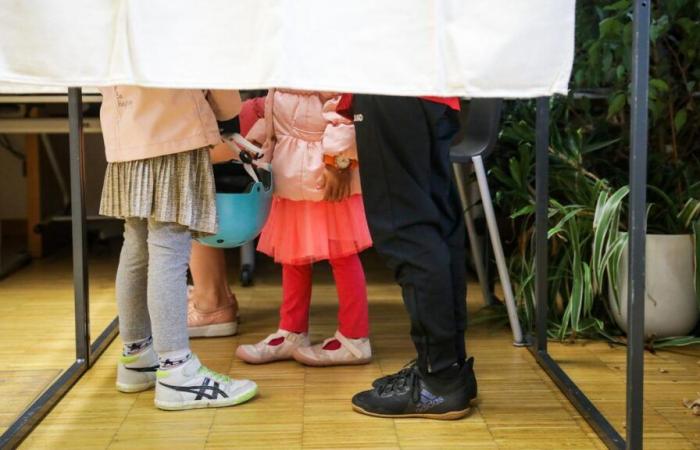The municipal and provincial elections of October 13 saw a level of abstention in Flanders that has never been equaled, but legal. Since 2021, voting is no longer compulsory in the north of the country for this type of election, unlike Brussels and Wallonia which have maintained the provision.
Only six out of ten Flemings went to vote last Sunday. Or 3.1 million voters out of more than 4.9 million voters. They were 90% during the 2018 municipal elections.
“We actually expected the participation rate to decrease since the latest polls indicated an abstention rate of almost 25%,” comments political scientist and professor at UCLouvain, Pierre Vercauteren. “But not on such a scale,” adds Jean Faniel, director general of CRISP (the Center for Socio-Political Research and Information). “We thought the decline in participation would be more gradual, but it is actually very pronounced.”
Those who resist the vote are no longer prosecuted by the courts
For around twenty years, the participation rate in elections has continued to plummet in Belgium. Those who resist are all the more willing to stay at home since the courts are no longer pursuing them.
The decision adopted at the start of the decade by the previous Flemish regional government of nationalist Jan Jambon regarding local elections obviously precipitated the movement. During a municipal or provincial election, Flemish voters are now free not to vote.
Already in the 1990s, certain leaders wanted to remove the voting obligation on the grounds that the majority of voters in the Vlaams Blok (currently “Vlaams Belang”) were not necessarily attracted to the far right, but were looking for first to express his dissatisfaction with the obligation to vote.
Political scientist Lieven De Winter draws a parallel with the Netherlands: “The 63% participation of Flemish voters corresponds to the rates observed in the Netherlands when they decided to abolish compulsory voting. In the elections that followed, they went from a 95% turnout to 70%. It then rose again during the following elections before falling again. Today, this rate no longer even exceeds 50%, especially when we talk about municipal elections.”
Enough to alarm those who think that abstention is the best weapon of populist and far-right parties, because it reduces the pool of votes for democratic parties.
An obstacle to individual freedom?
In Belgium, compulsory voting has existed since 1893, making it one of the rare countries in Europe to have maintained this provision for so long. Originally, the system was based on the idea that electoral participation was a civic duty, ensuring broad and inclusive democratic representation.
Its supporters already asserted that the abolition of compulsory voting risked marginalizing the least politicized groups or those most distant from political institutions, such as young people or disadvantaged populations. As for his opponents, they saw it as an obstacle to individual freedom (voting must be a right and not an obligation) and believed that the obligation to vote could lead to a form of disengagement or disinterest in politics. Which could be detrimental to the quality of democratic debate.
The decision to abolish compulsory voting for municipal elections in Flanders was mainly carried out by the previous Flemish government, and particularly by the N-VA of Antwerp resident Bart De Wever, a nationalist and conservative party. He has long been a strong advocate for the abolition of compulsory voting, believing that the measure better reflects individual freedom. It was adopted with the support of the Open VLD (the liberal party of outgoing Prime Minister Alexander De Croo) and the CD&V (Christian Democrat).
The south of the country remains in favor of the obligation to vote
On the other hand, in Wallonia and Brussels, the abolition of compulsory voting is not being implemented. French-speaking parties, such as the PS and the Mouvement Réformateur (MR, liberal), opposed this reform, arguing that it would harm the representation of the working classes.
Recently, the French-speaking liberal Louis Michel, former Minister of Foreign Affairs and former European Commissioner, once again said all the bad things he thought about the end of compulsory voting. “I find it a bit strong that we are introducing into the law the possibility of not going to vote,” he insisted. Where voting is not obligatory, it favors more right-wing parties or, in any case, a more privileged electorate who will vote. So, in terms of representation, this disadvantages vulnerable people or less wealthy, less trained people. And so, in relation to democracy, we do not realize but we would reintroduce by this means a capacity or census vote. Louis Michel denounces a “democratic regression”.
The results of the municipal elections in Flanders tend to prove him right, even if it is too early to make a correlation between the end of compulsory voting and the scores of certain parties.
Communists collateral victims
In Antwerp, Bart De Wever’s N-VA won 37% of the votes. If the communist PTB-PVDA, presented as its main competitor, comes in second place, it barely exceeds 20%. Which, some communist leaders argued, is the direct consequence of the end of the obligation to vote. Part of their electorate, more precarious and allergic to politics, would not have come.
On the other hand, Vlaams Belang was a hit. He multiplied the good scores in different places in Flanders and above all obtained the absolute majority in Ninove, a municipality located between Brussels and Ghent. It is true that voters had a score to settle with the democratic parties who had refused to govern with Vlaams Belang, winner of the 2018 municipal elections. The “belanger” Guy D’haeseleer will be the next mayor of this town in the valley of the Dender. At least if the accusations of fraud against his party are lifted.
Belgium thus finds itself with a hybrid model where voting is compulsory for certain elections (federal, regional, European) but not for others (municipal in Flanders). In the future, this could reignite debates about the coherence of this system.
In Luxembourg, everyone registered on the electoral roll is obliged to vote on election day. However, voters aged over 75 and Luxembourgers living abroad are exempt from compulsory voting.






